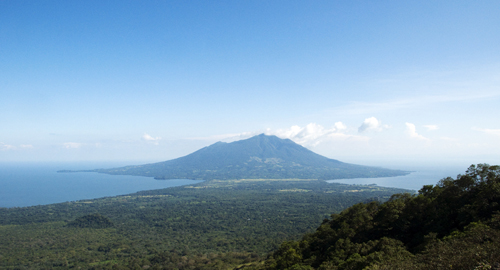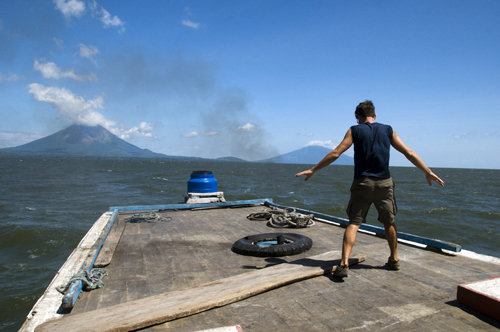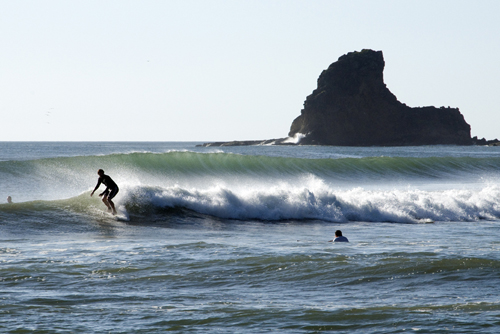Southern Nicaragua: Bargain Paradise
Pan-American Transmissions Part Two
“Pan-American Transmissions” is a travel series from Special Contributor Diego Cupolo as he travels south from Nicaragua to Argentina. He has few plans, a $10-a-day budget and one flute-playing gypsy companion. Check back as new dispatches are posted from the road.
Don’t assume that you need lots of money to travel.
Especially in Nicaragua, one of Central America’s safest, cheapest countries. Exploring this volcano-dotted, beach-lined nation is unlikely to cost more than a month in your stale apartment — that includes the plane ticket.
Yes, it’s true.
And don’t think the cheap price means a second-class experience. Southern Nicaragua is Costa Rica at a quarter of the cost with fewer tourists.
Ania and I started our Latin American odyssey in Nicaragua. We initially went north (a politically awakening experience), but most travelers head south, directly to colonial Granada, to the many Pacific surfing beaches and Isla de Ometepe — a fairy-tale jungle island formed by twin volcanoes in Lago de Nicaragua.
The following is a guide to the bargain paradise that is southern Nicaragua, a land of natural beauty and beautiful people. There is so much to do in Nicaragua that Ania and I spent two months bumming around the country.
Total cost (with the flight): $750 each. (Much, much less than my old room in Brooklyn. A profit, even, with a well-timed sublet.)
Between Managua and Granada
Most trips in Nicaragua start from the capital city, Managua. Once you arrive: get the hell out!
Leave as fast as you can. Managua has yet to recover from a massive earthquake that flattened its center in 1972. It’s extremely dangerous and there are few reasons to stay (unless you’re really interested in seeing the future of Port-Au-Prince.)
Most travelers go straight to Granada.
This is a mistake.
Try Masaya first, about halfway between Managua and Granada. The city’s sprawling, chaotic, labyrinth of a market is enough to keep visitors occupied for an afternoon, but there’s much more than that.
Volcan Masaya rises from the earth’s crust just outside the city where it belches poignant sulfur gases that turn all vegetation yellow upon contact. The hike up this very active volcano is short and rewarding. Its crater is simply daunting. It’s gigantic. Staring into the mouth of this fuming giant is so belittling that Spanish conquistadors called it “The Gates of Hell” when they first saw it. Before that, natives threw women into the volcano as sacrifices to their gods.
Also outside Masaya, on another terrible mountaintop, stands El Coyotepe prison. It was originally built as a fort to protect Masaya, then it was converted to a political prison where U.S.-backed dictator Anastasio Somoza kept and tortured his opponents. After the revolution and Somoza’s assassination, the prison was abandoned and used by pagan groups as a sacred ritual site. Today, it’s a museum with guided tours and nice views of the city.
Visitors can walk through dark, muggy jail cells and read various prayers that former prisoners scratched into the walls.
Torture is just another word until you stand in a torture chamber.
(Exhale.)
Less than an hour’s drive from Masaya, the mountain town of Jinotepe sits comfortably beneath a blanket of clouds. The city lacks major attractions and receives few tourists, but walking through its colorful markets and hilly streets can give visitors a taste of more traditional Nicaraguan towns found up north. Jinotepe is beautiful for it’s simplicity.
Laguna De Apoyo is also worth a stop before reaching Granada. Many say it’s the best, cleanest swim in Nicaragua. The lake is set in a volcano crater and, as a result, the water has a slight sulfur taste. They say it’s good for the skin.
Then, after Masaya, Jinotepe and Apoyo, only then, can you go to the Nicaragua’s colonial gem, Granada, and party with Australian tourists until the sun comes up. The city was built for pictures: horse-drawn carriages, flowers hanging over wooden balconies and well-preserved, colorful churches. There’s no need for details; the guidebooks have them all.
My duty is simply to tell you about all the wonderful things before reaching Granada – probably the prettiest city in Central America.
Pacific Nicaragua
Ten dollars for a full day of surfing: It’s possible on Nicaragua’s Pacific coast.
There are plenty of beaches to rent surfboards. Most of them (or at least the cheapest ones) are concentrated near San Juan del Sur, just north of the Costa Rican border.
Ania and I stayed at Playa Maderas, a small, scenic beach between large rock cliffs. Hospedaje Tres Hermanos is the only place to stay there and they charge $5 a night per tent. The rooms were $10 a night.
I spent a few days lounging around and swimming in the warm Pacific current while Ania “borrowed” people’s surf boards. Not bad. A true bargain paradise.
Just bring your own food — there are few stores in the area.
Side note: If surfing isn’t for you, Nicaragua’s Pacific coast is also lined with sea turtle hatcheries that accept volunteers. Tourists can help protect baby turtles from natural predators and hungry locals – people love turtle meat and turtle omelets.
Isla de Ometepe
Then there’s Ometepe, the main reason people visit Nicaragua. Formed by two adjacent volcanoes, Isla de Ometepe has a double personality that can deliver charming discount honeymoons and some of the best hiking in country.
Ten dollars will buy you a local guide to lead you up one of the two volcanoes. Volcán Concepción (5,282 feet) has better views while Volcán Maderas (4,573 feet) has better jungles.

Ania and I stayed in a few towns around the island and found extraordinary deals. In Moyogalpa, the main gate to Ometepe, there’s an old woman with drawn-on eyebrows that sells vegetables up the hill on the main road. Talk to her and get a nice room with kitchen use for $5 a night.
In Balgue, there are two “eco-farmish” hostels that give volunteers free accommodation. Both are hidden in the jungle and both welcome artists. They’re called El Zopilote and La Brisa.
But the absolute best place we stayed on the island was at Posada Chocoyo in the town of Merida. Ania and I got a lakefront room for $4 a night. We swam in the fresh water and watched the fishermen fish, all while thinking — laughing — about the baby boomers spending thousands of dollars for lakeside cottages in Vermont.
There, in Merida, it felt like we had the two volcanoes and the lake to ourselves.
All this and Isla de Ometepe still feels surprisingly undeveloped for being Nicaragua’s prime tourist destination. There are many dirt roads, few stores and fewer buses. The inconveniences can be refreshing for those that truly want to get away, but everything may change as the local government recently approved an international airport for the island.
That said: Go now!
Responsible travel
This article cannot end without stating the fact Nicaragua is so damn cheap is because it’s the second poorest country in the Western Hemisphere (second only to Haiti).
The majority of its residents live in poverty and lack employment opportunities. With the recent rise in tourism, it may be possible for some Nicaraguans to start climbing out of poverty, but this can only happen if you, the traveler, put your money in the right places.
1) Stay in hostels and hotels owned by locals, not red-nosed gringos from Nevada.
2) Buy groceries in street markets, not supermarkets. It’s the same food, only cheaper.
3) Also, get your meals in the streets, not restaurants. There are hundreds of old ladies carrying gastronomic gold in baskets on their heads.
Simply try spreading your money around instead of giving it to people or corporations that already have plenty. A dollar can go unbelievably far in Nicaragua, both for travelers and street merchants.
By Diego Cupolo
Read Part One of Pan-American Transmissions here. Coming soon from Pan-American Transmissions: A Cheap Bastard’s Guide to Traveling.

About the Author
 Diego Cupolo is a freelance photojournalist currently on the road to Tierra del Fuego. Most recently he served as Associate Editor for BushwickBK.com, an online newspaper in Brooklyn, and his work has appeared in The New Yorker, The Atlantic, The Star-Ledger, The Australian Times, Discover Magazine and many other publications. View more of his work at DiegoCupolo.com.
Diego Cupolo is a freelance photojournalist currently on the road to Tierra del Fuego. Most recently he served as Associate Editor for BushwickBK.com, an online newspaper in Brooklyn, and his work has appeared in The New Yorker, The Atlantic, The Star-Ledger, The Australian Times, Discover Magazine and many other publications. View more of his work at DiegoCupolo.com.



